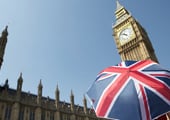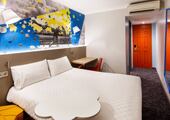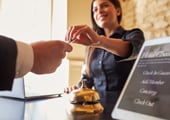1. Increased occupancy

While the British Hospitality Association claims there has been no tourism surge since Brexit, the UK's marketing agency VisitBritain is confident that the number of visits to the UK from overseas will rise by 4 per cent to 38.1m visits in 2017.
The weak pound, balanced by a strong dollar will bring an influx of US tourists 'spurred by a desire to explore new horizons in the face of an unpopular Republican presidency', predicts Craig Allen of hospitality recruiter The Change Group, which could mean greater demand for accommodation from this high-spending market.
There may too, be an uplift in bookings from UK travellers as the weakened pound makes international holidays less affordable for Brits.
The positive news is dampened, however, by the fact that some tourists may avoid the UK on principle thanks to Brexit's anti-immigration links and that Brexit has sparked inflationary pressures, making it harder for hospitality businesses to remain competitive.
"With the uncertainty surrounding the pound, it will be difficult for hospitality businesses to keep prices low, and cities – especially London - should continue to stress that they are open for business and to investment," warns Coffer Peach.
2. Bold design

Brand will no longer mean bland when it comes to design and interiors. While soft, muted tones and monochrome won’t disappear, they’ll be injected with bold splashes of colour or quirky design features, to inject more personality (as seen already with the Philip Watts-designed Ibis Styles Manchester – pictured here) predicts hospitality furniture manufacturer Style Matters.
“Whether it be small pops of colour with accessories or statement pieces of bright furniture on a black and white base, this cool and charismatic look is ideal for just about environment,” says Style Matter’s Claire Fox, whose company helped furnish Hotel Gotham in Manchester in the same way.
"I think there will be a shift in thinking in terms of what can be called a design hotel," adds designer Philip Watts. "Time was when such a term meant poe-faced luxury, now increasingly I think within hotel design you will see an emphasis on design but without the pretension - 'designed' rather than 'designer', particularly in the budget and mid scale brands."
Bold, vintage florals are also set to be a big look this year in hotels with furniture even set to be adorned with flowers: Think Soho House & Co’s forthcoming London hotel The Ned with its Art Deco-style bedrooms including some bright floral flourishes.
“Vintage florals have been a favourite amongst pub designers and specifiers for some time, but we’re increasingly seeing this trend grow within the hotel sector too," says Fox.
"Traditionally, designers would implement florals through their wallpaper and flooring, however we’ve started to see a shift away from this, with furniture providing the perfect platform to showcase this stunning look.”
3. Smarter staffing

There will continue to a shortage of talent in key roles, with recruitment challenging and concerning for hotel companies with a large percentage of non-British staff, according to The Change Group. However, it is hopeful the government will chart a moderate course through Brexit, meaning employees from the EU are likely to continue in roles.
The Change Group founder and director, Craig Allen says: “The UK has so far successfully weathered the Brexit blast and shown continued growth. We predict that this is likely to continue into 2017.
“From a recruitment perspective, we anticipate that the market will remain positive but difficult, with a shortage of talent in many key roles. While 2017 will be governed by uncertainty, and there are many economic factors working against the hospitality sector, there are also several positive factors which will enable the industry overall to thrive.”
"I am confident that ultimately government will be pragmatic on work permits," agrees hotel industry consultant Melvin Gold. "There are too many sectors including hotels and restaurants that are dependent on a relatively flexible labour market. The other positive for employment is the growth in the Living Wage which increases hotels' competitiveness in recruitment, albeit the affordability of this is still an issue for employers."
Last year saw the creation of a number of in-house training academies or schemes at a host of hotel companies and that is likely to continue into 2017 to help the industry safeguard its future workforce. The emphasis too will be on recruiting staff with personality rather than on skill.
Adam Rowledge, general manager at the Georgian House Hotel in London, says the ongoing challenges will just mean hoteliers will have to act smarter in staffing.
“Following the introduction of the apprenticeship levy, the impact of the National Living Wage increase and significant increase in business rates, hotels are going to have to get even smarter and will need to focus on retaining talent as it has been reported that we'll see a slowdown in the supply of EU workers due to the exchange rate," he adds.
4. The year of storytelling

At last October’s Annual Hotel Conference Robin Sheppard, chairman of Bespoke Hotels, said storytelling would be the new buzzword for the hotel industry and there is already evidence that the industry is relying on it for their marketing messages. Premier Inn’s latest TV ad campaign is centred around the stories of its guests and the reasons for their use of the hotels while online booking platform Expedia has replaced its usual service and price-focused ads with a series of documentaries featuring interesting travel stories from real people.
And how those stories are told will be important too, particularly for the industry’s next target – the post-millennials.
“Catching the attention of Generation Z will be the ultimate challenge for the industry with an even shorter attention span they thrive on adventure. Video and visual content marketing will play a major role in engaging with them. This will be emphasized further in 2017,” predicts Wayne Androliakos, director of operations for Cycas Hospitality.
5. Bespoke loyalty

Loyalty schemes are set to move up another gear as competition increases and guests come to expect a more personalised experience. Hilton Worldwide with its HHonours loyalty scheme, giving guests the chance to swap points for experiences such as music concerts and driving days, will no longer be the only hotel company to innovate in this area.
Hotel companies are increasingly turning to technology and social media to gather data on guests which can be used to reward loyalty with bespoke offers such as gift vouchers for birthdays, bouquets for a honeymooning couple, or a gourmet surprise for travelling foodie.
Last summer AccorHotels announced it was deploying Local Measure, a location-based customer intelligence platform which allows interaction between its guests and the hotel to give a tailored service and more will no doubt follow suit in 2017.
And the good news is that the hotels that reward guests for booking direct WILL benefit: “Brand loyalty is set to increase. Customers will look to increasingly book direct with the well-known hotel brands which are simpler to access (no middle man) and where they can join their loyalty schemes and take advantage of better deals and add ons," says Philip Bolson, group director of operations for Splendid Hospitality Group.
6. Done deals

"History will most likely judge 2016 as a year that people made democratic choices that surprised the establishment. 2017 will start to see some of the consequences of those choices but we will only see part of the journey, not the final destination," says hotel industry consultant Melvin Gold, who predicts continued investment in the UK's hotel sector, albeit a little slower than we saw in 2016.
"In the investment arena some will see threat while others envisage opportunity," he says. "That should enable buyers and sellers to have vigorous discussion and to find agreement on price so deals get done, perhaps not at record high prices but nonetheless at a mutually agreeable transaction price.
"The bigger issue will be the quantum of hotels that are actually offered for sale in 2017 after the active portfolio market in recent years."
7. The rise of the themed afternoon tea

Afternoon tea has been the preserve of the luxury hotel sector for years, but with competition from within the sector and outside it heating up, F&B directors and pastry chefs will be under pressure to make theirs the most attractive: No longer will cucumber sandwiches, scones and pots of tea cut the mustard.
"At the higher end there is so much competition that you have to stand out from the crowd now, so we are seeing more creative offerings," says Keith Newton managing director of website afternoontea.co.uk.
Those already planning to tap into the trend include Boringdon Hall in Devon, whose head chef Scott Paton has created a different tea for each month of the year (examples include Beauty & the Beast in March and Secret Garden in May) and 1919 The Cottage in the Wood in the Cotswolds where head chef Mark Redwood is planning to launch a Gentleman's Afternoon Tea in 2017.
The offering will feature a more masculine menu of stilton sausage rolls, crispy oyster with jalapeno mayonnaise and steak tartar Yorkshire pudding & horseradish paired with locally brewed British ales and stout, and to follow, chocolate and ale cake paired with whiskey.
“Afternoon tea has enjoyed a huge surge in popularity over recent years and is becoming a bit of a pastime for many who are on the lookout for a variety of experiences," says Redwood.
